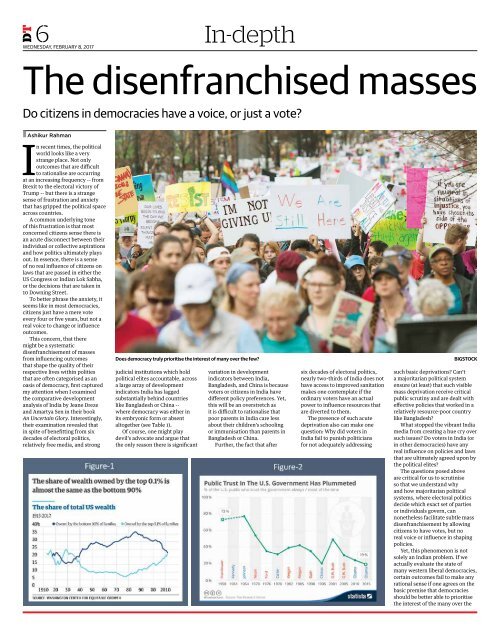You also want an ePaper? Increase the reach of your titles
YUMPU automatically turns print PDFs into web optimized ePapers that Google loves.
6<br />
wednesday, february 8, <strong>2017</strong><br />
DT<br />
<strong>In</strong>-depth<br />
The disenfranchised masses<br />
Do citizens in democracies have a voice, or just a vote?<br />
• Ashikur Rahman<br />
<strong>In</strong> recent times, the political<br />
world looks like a very<br />
strange place. Not only<br />
outcomes that are difficult<br />
to rationalise are occurring<br />
at an increasing frequency -- from<br />
Brexit to the electoral victory of<br />
Trump -- but there is a strange<br />
sense of frustration and anxiety<br />
that has gripped the political space<br />
across countries.<br />
A common underlying tone<br />
of this frustration is that most<br />
concerned citizens sense there is<br />
an acute disconnect between their<br />
individual or collective aspirations<br />
and how politics ultimately plays<br />
out. <strong>In</strong> essence, there is a sense<br />
of no real influence of citizens on<br />
laws that are passed in either the<br />
US Congress or <strong>In</strong>dian Lok Sabha,<br />
or the decisions that are taken in<br />
10 Downing Street.<br />
To better phrase the anxiety, it<br />
seems like in most democracies,<br />
citizens just have a mere vote<br />
every four or five years, but not a<br />
real voice to change or influence<br />
outcomes.<br />
This concern, that there<br />
might be a systematic<br />
disenfranchisement of masses<br />
from influencing outcomes<br />
that shape the quality of their<br />
respective lives within polities<br />
that are often categorised as an<br />
oasis of democracy, first captured<br />
my attention when I examined<br />
the comparative development<br />
analysis of <strong>In</strong>dia by Jeane Dreze<br />
and Amartya Sen in their book<br />
An Uncertain Glory. <strong>In</strong>terestingly,<br />
their examination revealed that<br />
in spite of benefitting from six<br />
decades of electoral politics,<br />
relatively free media, and strong<br />
Does democracy truly prioritise the interest of many over the few?<br />
judicial institutions which hold<br />
political elites accountable, across<br />
a large array of development<br />
indicators <strong>In</strong>dia has lagged<br />
substantially behind countries<br />
like Bangladesh or China --<br />
where democracy was either in<br />
its embryonic form or absent<br />
altogether (see Table 1).<br />
Of course, one might play<br />
devil’s advocate and argue that<br />
the only reason there is significant<br />
variation in development<br />
indicators between <strong>In</strong>dia,<br />
Bangladesh, and China is because<br />
voters or citizens in <strong>In</strong>dia have<br />
different policy preferences. Yet,<br />
this will be an overstretch as<br />
it is difficult to rationalise that<br />
poor parents in <strong>In</strong>dia care less<br />
about their children’s schooling<br />
or immunisation than parents in<br />
Bangladesh or China.<br />
Further, the fact that after<br />
six decades of electoral politics,<br />
nearly two-thirds of <strong>In</strong>dia does not<br />
have access to improved sanitation<br />
makes one contemplate if the<br />
ordinary voters have an actual<br />
power to influence resources that<br />
are diverted to them.<br />
The presence of such acute<br />
deprivation also can make one<br />
question: Why did voters in<br />
<strong>In</strong>dia fail to punish politicians<br />
for not adequately addressing<br />
bIGSTOCK<br />
such basic deprivations? Can’t<br />
a majoritarian political system<br />
ensure (at least) that such visible<br />
mass deprivation receive critical<br />
public scrutiny and are dealt with<br />
effective policies that worked in a<br />
relatively resource-poor country<br />
like Bangladesh?<br />
What stopped the vibrant <strong>In</strong>dia<br />
media from creating a hue cry over<br />
such issues? Do voters in <strong>In</strong>dia (or<br />
in other democracies) have any<br />
real influence on policies and laws<br />
that are ultimately agreed upon by<br />
the political elites?<br />
The questions posed above<br />
are critical for us to scrutinise<br />
so that we understand why<br />
and how majoritarian political<br />
systems, where electoral politics<br />
decide which exact set of parties<br />
or individuals govern, can<br />
nonetheless facilitate subtle mass<br />
disenfranchisement by allowing<br />
citizens to have votes, but no<br />
real voice or influence in shaping<br />
policies.<br />
Yet, this phenomenon is not<br />
solely an <strong>In</strong>dian problem. If we<br />
actually evaluate the state of<br />
many western liberal democracies,<br />
certain outcomes fail to make any<br />
rational sense if one agrees on the<br />
basic premise that democracies<br />
should be better able to prioritise<br />
the interest of the many over the


















